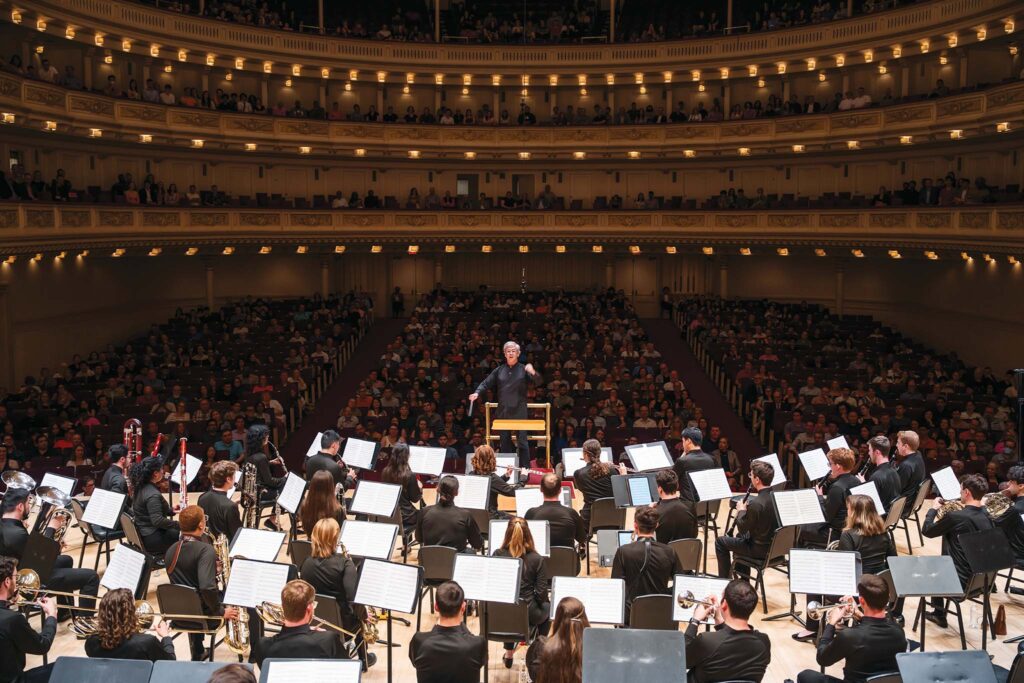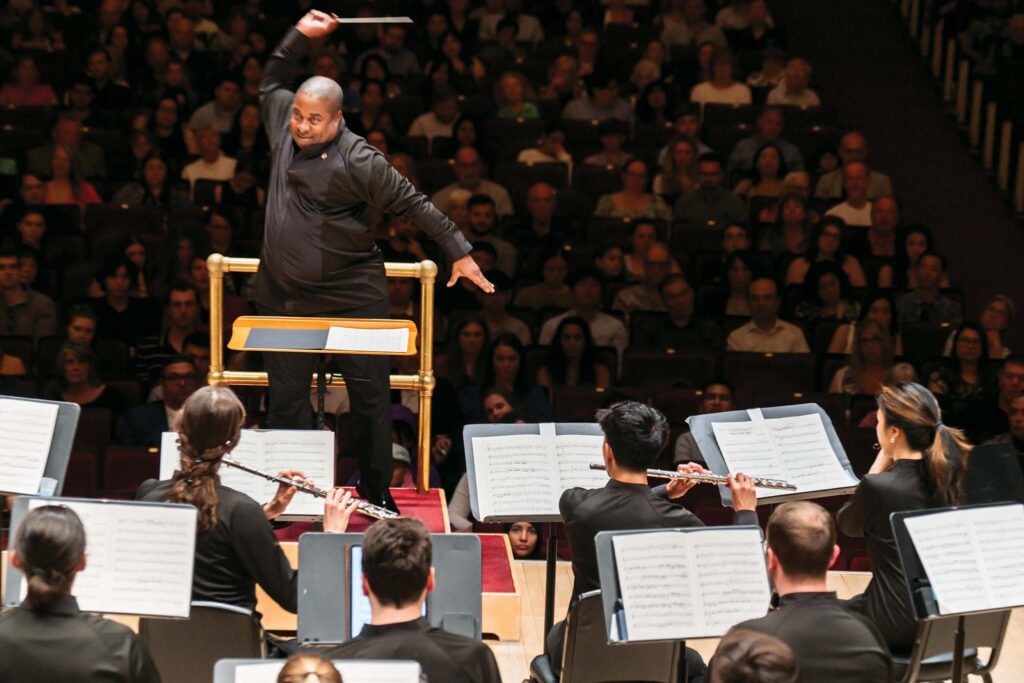UT’s Wind Ensemble Celebrates 50th Anniversary at Carnegie Hall

On Feb. 27, 2005, longtime director Jerry Junkin stepped up to the podium on one of the most famous stages in the world, ready to conduct The University of Texas wind ensemble in their second appearance at Carnegie Hall.
Among a selection of notable pieces, the highlight of the afternoon was the New York debut of “Circus Maximus,” an ambitious symphony composed by the Pulitzer Prize, Academy Award, and Grammy Award winner John Corigliano and commissioned specifically for UT’s wind ensemble, the first—and only—symphony Corigliano composed for concert band.
“I found a complete love affair for me and the band,” Corigliano says of the experience working with Junkin on the piece.
The momentous occasion drew the glitterati of the wind world and earned high praise, solidifying what everyone who had ever had the pleasure of listening to Junkin conduct already knew: The UT wind ensemble is not just respected in the state of Texas or good for the university level—they are the best in the country. They are competitive on the world stage, masterfully playing symphonies crafted by some of the leading, most decorated composers of the 21st century.
These musicians had reached the top of their craft, with Junkin, BM ’78, MM ’79, 1996 Outstanding Young Texas Ex, ably at the helm. Nineteen years after a program-defining performance, the ensemble returned to Carnegie this past June in celebration of its 50th anniversary—marking half a century of setting the benchmark for wind music.

In 1952, responding to the waning interest in big band music and lack of original composition written for wind instruments, Frederick Fennell developed the modern iteration of the wind ensemble, pioneering the new format at the University of Rochester.
By 1974, wind ensemble music still played second fiddle to the orchestra, but interest in band music was growing. Tom Lee, then the director and founder of Ohio University’s wind ensemble, saw potential at UT to build “something of significance that would last,” a program mentioned in the same breath as the University’s other achievements.
That year, he founded UT’s wind ensemble. For 11 years, he grew its reputation for not only excellent musicianship, but original composition. One student in particular stood out to Lee: fourth-generation Longhorn Jerry Junkin, the son of a legendary Texas band leader. As an undergraduate, Junkin played clarinet in the Longhorn Band under the renowned Vincent DiNino and quickly joined the wind ensemble, impressing Lee with his seemingly instinctual talent for conducting.
When Lee left Austin to take a position at UCLA in 1985, he recommended Junkin take his place. Lee accomplished what he set out to do, offering Junkin a well-respected, talented ensemble. Over the next 36 years, Junkin would build on this foundation to become a globally recognized conductor.
“The [UT wind ensemble] is one of the many great compliments to Texas,” Lee says.
Junkin has taken the ensemble on statewide, national, and international tours; commissioned the leading composers of the day; invested in faculty who advance the medium; and serves as the music director and conductor of the Hong Kong Wind Philharmonia and the artistic director and conductor of the Dallas Winds.
“What happens in Texas happens everywhere,” composer John Mackey says. “Everyone follows Texas for music education, and Jerry is the pinnacle of band [music] in the country.”
Under Junkin’s leadership, a Carnegie appearance is no longer a once-in-a-program moment; it’s generational.
“My goal has always been to have one iconic experience within a four-year span,” Junkin says. “Students will look back and say, ‘It’s really great what they’re doing now, but you know when I was there it was really the best time.’”
It’s a cycle benefiting everyone involved: Aspiring musicians are attracted to UT because of these prestigious opportunities, their talent in turn builds the caliber of the program, and their careers promote the ensemble’s reputation among the top universities, military bands, orchestras, and middle school and high school programs of the country.
For Julee Walker, BM ’03, an associate professor of music at Texas A&M University-Commerce, her moment was recording “Bells for Stokowski” her senior year, an album The New York Times named one of the best classical CDs of the year.
For Gunnery Sgt. Zachary Gauvain, BM ’09, it was debuting Corigliano’s “Circus Maximus” and taking it on tour throughout Europe the summer of 2005. He currently plays clarinet in the United States Marine Band and performed in the 58th U.S. Presidential Inauguration in 2017.
When Michael Hung, BA, BSA ’24, joined the wind ensemble his sophomore year, he wondered which iconic experience he would remember. His final concert as a student surpassed all his dreams when he was selected to play in the 50th anniversary concert at Carnegie Hall.
On June 2, 2024, the ensemble returned to the Carnegie stage for the third time in program history. As students shuffled into the hallowed hall at 8:30 a.m. Sunday morning for their pre-show rehearsal, the awe was apparent on their faces and in their immediate need to capture the empty hall on their phones. This moment was why they strived to be accepted in the prestigious ensemble, why they rehearsed and fine-tuned for countless hours, why they chose to come to The University of Texas.
If two previous highly praised performances created high expectations, the musicians surpassed them with ease, delivering a performance one reviewer described as, “a tour-de-force that wowed not only their many supporters, but also this listener who will remember it for a very long time.”
They started with a lively rendition of the “Festive Overture” by Shostakovich, followed by the world premiere of the wind transcription of David Biedenbender’s “River of Time.” The first half closed with a moving performance of assistant professor and renowned composer Omar Thomas’ “Of Our New Day Begun,” written in honor of the nine victims of the 2015 Emanuel African Methodist Episcopal Church shooting in Charleston, South Carolina.
Longhorn Band Director Cliff Croomes, BA ’01, took the podium to conduct UT professor and award-winning composer Donald Grantham’s “Don’t You See?” before passing the baton back to Junkin for the final symphony of the concert, John Mackey’s “Wine-Dark Sea,” commissioned in 2013 in honor of the 100th anniversary of the Butler School of Music.
Of note, four of the five pieces played were written by living composers, all of whom were present and bowed on stage after their respective pieces. The finale of the afternoon, appropriately, was “Deep in the Heart of Texas,” which included the requisite, enthusiastic audience participation.
For professors and students alike, it was a career-defining performance.
For Junkin, it was yet another feather in his cap. He admits other universities have come calling over the years, but he never seriously considered leaving his alma mater. Looking forward, he thinks the best is still ahead.
“Am I as excited as I was the first day? No, I’m more excited now,” Junkin says. “It’s better than it’s ever been—and it can only get better.”
CREDITS: Chris Lee (2)













3 Comments